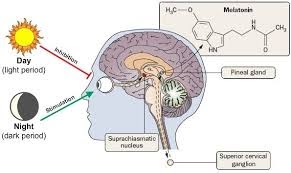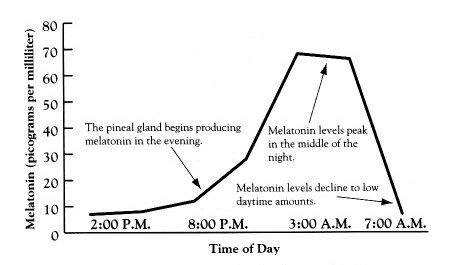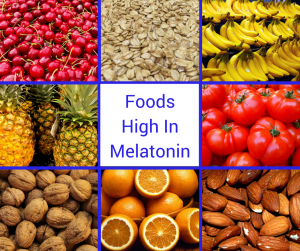Melatonin and Sleep
Medically Reviewed by Dr. Sahil Chopra
Melatonin is the hormone responsible for sleep. Like other hormones, melatonin is a key in kicking off a series of biochemical reactions and bodily events.
In this guide we’ll cover what melatonin is and how it helps induce sleep. Next we’ll discuss natural melatonin found in food and wine, vs. melatonin supplements and agonists you can buy at the pharmacy. Finally, we’ll discuss melatonin’s efficacy as a sleep aid, potential side effects, and how to take it.
What is melatonin?
Melatonin is a hormone produced naturally by the pineal gland in your brain. What does melatonin do? It plays a key role in signaling to your body that it’s time to fall asleep.
Melatonin and the sleep-wake cycle
The absence of light and the presence of darkness stimulates the production of melatonin. Light inhibits the natural production of melatonin. As darkness reaches the back of the retina, neurons transport this signal of “darkness” to the suprachiasmatic nucleus which in turn passes the signal onto the pineal gland to stimulate the production of melatonin. The pineal gland’s production of melatonin does not regulate the body’s circadian clock. Rather, that is the function of the suprachiasmatic nucleus or nuclei (SCN) which is located elsewhere in the brain. Sometimes called “the hormone of the night”, melatonin does affect the SCN, however, and is part of the overall circadian system.

Source: Stanford
When the melatonin leaves the pineal gland, it binds to receptors in the suprachiasmatic nucleus or nuclei (SCN). The master-clock SCN slows its firing frequency, reducing the arousal levels in the body and signaling the onset of a sleep period. In a body with typical sleep patterns the melatonin levels start to rise 14 to 16 hours after awakening.
The melatonin cycle operates roughly opposite of body temperature cycle. In late afternoon and early evening, the body temperature is the highest and the melatonin is the lowest. Conversely, in the early morning, the body temperature is at its lowest and the melatonin level is at its highest.

Source: ChemWiki
In humans and other diurnal animal species, melatonin secretion happens during normal sleep hours, in contrast to nocturnal animals which are at the peak of their activity while producing melatonin. The melatonin cycle happens even in night workers working under bright lights, but light may suppress it.
Melatonin is ubiquitous through the living world and can be found in most animals and plants. Its role in the circadian cycle extends through many species. Scientists believe the role of melatonin in the circadian control mechanism goes back 700 million years.
Natural melatonin vs. supplements and agonists
Your brain naturally produces melatonin. Small amounts of melatonin are found in food and wine. Melatonin can also be purchased as a supplement or in agonist form at the pharmacy.
How does the body naturally produce melatonin?
Melatonin is produced by the pineal gland, a small gland in the brain. The brain makes this neurohormone from the amino acid tryptophan.
The pineal gland is outside the blood-brain barrier. It converts tryptophan to serotonin and keeps the serotonin during daylight hours. When it gets dark, the body releases norepinephrine onto the pineal gland cells, causing them to release the serotonin so that it can be metabolized by the enzymes SNAT (serotonin N-acetyltransferase) and HIOMT (Hydroxyindole-O-methyltransferase). The resulting compound is melatonin which enters the cerebrospinal fluid and bloodstream.
Melatonin is lipid-soluble and attaches to albumin in the blood which is how it is transported around the body. The solubility in lipids helps it get through cellular membranes. The liver eventually breaks down melatonin; a small fraction is removed by the kidneys.
The chemical name for melatonin is N-acetyl-5-methoxytryptamine (CAS 73-31-4). Here’s the structure, for chemistry buffs:

Chemical structure of melatonin
Can you increase melatonin through your diet?
Despite what you might read on some websites about foods rich in melatonin, there is no evidence that diet is a significant source of melatonin in the body. The levels naturally occurring in foods is not high enough that an individual can change his or her melatonin level just from diet. However, there are some foods that can help you sleep better by assisting melatonin production in the body.
Natural melatonin in food
 Melatonin is present in foods like tomatoes and potatoes at very low levels, and such foods do not form a viable source of dietary melatonin. Consumption of walnuts has been shown to raise melatonin levels in the blood and nuts such as almonds may also have enough melatonin to affect serum levels. Some Italian researchers have speculated that the heart-healthy “Mediterranean diet” may derive its power partly from melatonin content in plants, although they have no hard proof.
Melatonin is present in foods like tomatoes and potatoes at very low levels, and such foods do not form a viable source of dietary melatonin. Consumption of walnuts has been shown to raise melatonin levels in the blood and nuts such as almonds may also have enough melatonin to affect serum levels. Some Italian researchers have speculated that the heart-healthy “Mediterranean diet” may derive its power partly from melatonin content in plants, although they have no hard proof.
Foods rich in vitamins and tryptophan assist in the body’s serotonin and melatonin production. These include:
- Bananas
- Oats
- Pineapples
- Oranges
- Tomatoes
- Cherries
- Nuts
Melatonin in wine
Does wine contain melatonin? And does this partly explain why so many people can relax with a glass of wine? It’s plausible that the melatonin content in wine could help regulate the circadian rhythm. Researchers have suggested that that hormone can be found in small quantities in wine.
Italian researchers found melatonin in extracts from different wine grapes, including Nebbiolo, Croatina, Sangiovese, Merlot, Marzemino, Cabernet Franc, Cabernet Sauvignon and Barbera. Melatonin appears to form as the grapes ripen. The anti-mold fungicide benzothiadiazole, which wineries spay on their plants to protect the grapes, seems to increase the concentration of melatonin.
It has long been known that grape juice and wine have health benefits. The chemicals in the grapes that provide these benefits include resveratrol, anthocyanins and proanthocyanidins. It now appears possible that melatonin is another phytochemical in grapes that people can benefit from.
Melatonin supplements and agonists
Melatonin supplements and agonists offer high levels of the hormone and can affect serum melatonin levels and influence sleep patterns. They can be useful for shifting the body’s internal time clock to treat sleep disorders like insomnia, and even depression. Melatonin and melatonin agonists can also be used to treat such time-shifting problems as delayed sleep phase disorder, jet lag and shiftwork disorder.
Both are available over-the-counter at the pharmacy in gel or pill form. Melatonin supplements contain either synthesized melatonin or natural melatonin from animal sources, along with other filler materials. Melatonin agonists, on the other hand, are drugs that act like melatonin in the body – that interact with the melatonin neurons and amplify the body’s melatonin circadian signal.
Are melatonin supplements safe?
The biggest concern about melatonin supplements is not that the melatonin itself is likely to have a harmful effect, but that the supplements are made and sold without the same safety and quality controls that drugs are. There is excessive dose to dose variability within melatonin supplements. In this study that analyzes 31 melatonin supplements, authors found Melatonin content was found to range from ?83% to +478% of the labelled content.
In most European countries, melatonin is a prescription drug. In the U.S., it is sold as a supplement. Supplements are not subject to manufacturing purity regulations the way drugs are. The other filler materials in the supplement may vary considerably. The dosages are not consistent from supplement to supplement, sometimes even from the same seller.
There is special concern about melatonin because it is a hormone. You cannot buy estrogen or testosterone over-the-counter. But if the melatonin is packaged as a “supplement” (not a food or a medicine), it can be sold to any adult.
Melatonin agonists
The development of melatonin agonists is one of the most exciting frontiers in sleep medicine.
What is an agonist? In pharmacology, agonists help, mimic, amplify the effects of chemicals naturally produced in the body. They bind to the same receptors as the biological chemical.
But you might think: why use a melatonin agonist if the real thing – melatonin – is cheap and available over-the-counter? The main reason is the varied effectiveness of melatonin supplements, as well as the concern over the side effects of fillers. As we discussed above, some doctors are reluctant to recommend patients take melatonin. Melatonin agonists can be a good alternative.
There are two melatonin agonists available in the pharmacy at present: ramelteon and tasimelteon.
- Tasimelteonhas been approved for treatment of Non-24 sleep-wake disorder, commonly experienced by blind people. Since light and darkness regulate the circadian system and blind patients are not able to do that, using a melatonin agonist at the same time everyday mimics what light and darkness does for most people.
Melatonin as a sleep aid
Melatonin has been used by millions of people – with and without doctor’s supervision – to overcome insomnia and circadian challenges like jet lag. People with disease, an aging brain, or life circumstances find themselves with blunted diurnal rhythms.
Some blind people use melatonin supplements to help them sleep on the same cycle as sighted people (who have visual sunlight cues to adjust their cycles). It seems to work in about half of people who try it. Blind teens are advised to not use melatonin because of concerns that it might affect puberty.
Melatonin has been used to adjust the circadian system in sighted people with the following sleep problems and circadian rhythm disorders:
- Jet lag
- Shift work sleep disorder
- Delayed sleep phase syndrome (DSPS)
- Advanced sleep-phase syndrome (ASPS)
- Free-running sleep disorder
- Irregular sleep wake rhythm disorder
High melatonin levels (either natural or from taking melatonin tablets) are associated with the type of physiological activity seen before bedtime – sleepiness, lower core temperature, and loss of body heat. This suggests that melatonin pills can make people sleep better or longer. They are not as strong as prescription sleep aids, however, and the US Food and Drug Administration has never actually approved melatonin for circadian rhythm sleep disorders.
Is melatonin effective as a sleep aid?
Melatonin’s effectiveness as a supplement is mixed. While melatonin appears to be effective for some people, experts warn against expecting too much. No long-term safety data exist, and the optimum dose and formulation for any application remains to be clarified.
A 2005 meta-analysis (an analysis of other studies on melatonin) concluded that melatonin treatment reduces sleep onset latency, increased sleep efficiency, and increased total sleep duration. However, the average increase in sleep duration was only 13 minutes. The Agency for Healthcare Research and Quality conducted a meta-analysis and said there was a “substantial amount of heterogeneity across studies of melatonin.” Substantial amount of heterogeneity meaning there are no clear answers.
How melatonin actually causes sleepiness is unknown as are the details of its metabolism and excretion from the body. The government’s Agency for Healthcare Research and Quality quotes a half-life between 30 minutes and 2 hours and further says “the time required to reach peak values ranged from 0.25h to 13h”. This is an astonishingly wide range, based probably on the different formulations of the melatonin supplements.
Further complicating matters is that the bioavailability of supplements varies widely. Bioavailability refers to how likely the melatonin is to get into your bloodstream. This depends on the composition of the pills, and how many other fillers they may contain. Some studies have shown that only a small dose of about 0.3 milligrams is necessary for a restful effect. However, it’s not uncommon for commercially available melatonin pills to contain 10 times that amount.
Side effects of melatonin
Melatonin appears relatively benign when used as a supplement with no pattern of side effects at normal dosages.
At very high dosages, the blood levels of melatonin can exceed a thousand times the normal level, and result in symptoms including hypothermia and headache. Like other sleep aids, excessive use of this hormone can result in rebound insomnia through desensitization of receptors.
Melatonin lowers sperm count and reduces sperm motility. It also appears to reduce libido. In women, large amounts of melatonin can affect changes in blood serum concentrations of reproductive system hormones: estrogen, progesterone, and luteinizing hormone. There are fears that melatonin consumption can stop ovulation and menstruation or induce miscarriages, although science on these questions appears to be sketchy.
One good thing about melatonin, compared to most sleeping pills, is that users do not experience extra sleep inertia in the morning, provided they don’t take too much. Supplements also appear to be more useful for naturally light sleepers.
Does melatonin cause vivid dreams?
There are user reports that melatonin causes vivid dreams. Actually, all sleep aids appear to some users to produce more vivid dreams.
What is most likely happening is that the drug modifies the sleep cycle so the person emerges from REM sleep (when dreams are most vivid) to waking quickly – more quickly that when no drug is used. The user subjectively reports the drug as producing vivid dreams.
How to take melatonin
Like prescription and antihistamine sleeping pills, melatonin should be taken shortly before the person wants to go to sleep. You will not not feel an onslaught of sleepiness; the supplement has a subtle effect.
If you’re taking melatonin as a sleep aid against insomnia, the best approach is to start slow. Do not assume that the more you take, the better it will work, or the faster you will fall asleep. Taking too much melatonin can affect your sleep cycle and result in disrupted sleep. Start with the smallest dose and increase it by 0.5mg as needed.
The standard dose of melatonin for adults is between 2 tenths of a milligram and 5 milligrams. Take it 60 minutes before you want to fall asleep.
| Use | Suggested dosage |
|---|---|
| Jet lag | 0.5 – 5 mg a few days before and after arrival |
| Delayed sleep phase syndrome | 0.3 to 3 mg about 2 hours before anticipated or goal sleep time |
Recommended melatonin use for children
Melatonin can be helpful for children who have difficulty falling asleep due to insomnia, ADHD, autism, or other neurological disorders. Melatonin is not recommended for children under the age of 3, or who are experiencing temporary sleeplessness due to a short-term illness, situational anxiety, or another physical disorder.
Recommended melatonin use for elderly
The melatonin level in the body declines with age, and even more so in people with dementia. Supplements of melatonin do not appear to improve the cognitive abilities of with dementia patients. But, melatonin can be helpful in reducing age-related insomnia for older adults without dementia.
Despite what some marketers may claim, there is no evidence that melatonin slows the effects of aging in humans. The basis for this speculation was some results in laboratory mice that suggested the hormone had some protective effect. But there is no real evidence that taking melatonin pills helps keep you young.